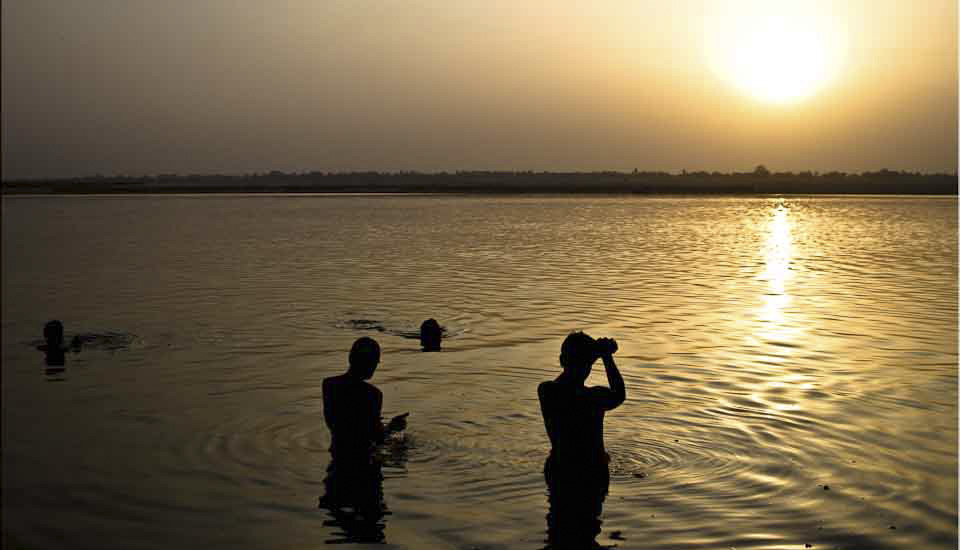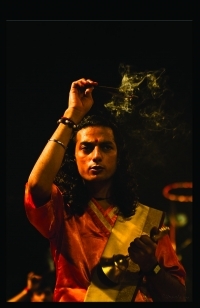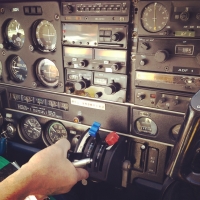.jpg)
Inside Brihadisvara Temple
Looming tall (66 m – 216 ft), the vimana (sanctum tower) inside the UNESCO-listed Brihadisvara Temple is delicately carved and warmly coloured in the morning light. This temple in Thanjavur, Tamil Nadu, is considered a masterpiece of Chola art and architecture.
This was my first sojourn into Southern India – and I was finding everything as different as it could be!
I was travelling as part of a small-group tour. We had just spent a few days in Puducherry (see: Weekly Wanders Pondicherry) and had set out early one morning in our bus for the city of Thanjavur, which has been called the ‘cultural hub of Tamil Nadu‘ and an ’embodiment of South Indian art and craft.’
Our first stop, in the port city of Cuddalore, was at a cottage industry manufacturing products from coir; producing rope, mats, brushes, mattresses, and other wares from the outer husk of coconuts. I actually found this fascinating, as I have often wondered what use can be made of the mountains of coconut shells one sees in the tropics.
Once in Thanjavur (Tanjore), we settled into our rooms in a beautiful, centrally-located, Tamil-style hotel, before visiting another small workshop – this time, one where traditional religious icons are painstakingly crafted from bronze.
The heart of Thanjavur is the magnificent Brihadisvara (Brihadeeshwara, Brihadiswara) Temple, built in the 11th century by the reigning Chola king.
To my naive eye, the ancient temple architecture of Southern India has more in common with that seen in neighbouring Sri Lanka – and even Bali and Siem Reap – than with that of Northern India. This actually makes sense, as during the height of the Tamil Chola Empire (848–1279), the dynasty ruled over Sri Lanka and stretched its influence across portions of what are now Myanmar, Thailand, and Cambodia, and well into Indonesia.
The UNESCO World Heritage Listed Brihadisvara Temple is considered a remarkable example of Dravidian artisanship and one of South India’s most magnificent architectural accomplishments. While paying tribute to both Hindu and Buddhist deities, the 1000 year-old temple was dedicated to Shiva by the king who commissioned it, Rajaraja Chola I. The surrounding fortified walls were added after the 16th century.
Join me for a cultural snapshot of Tamil Nadu:
.jpg)
Home and Factory
Our first stop on the four-hour drive between Puducherry and Thanjavur was at a typical concrete home in Cuddalore …
.jpg)
Twisting Coir Rope
… where the family conducts the labour-intensive job of twisting coconut fiber into rope.

Double-Strength
Our guide Louis jumps in to show how the spun fibre can then be neatly doubled for extra strength.

Portrait of a Spinner

A Tangle of Coir Rope

Chai Wallah
My favourite road-stops involve freshly-fried samosas and hot coffee or spiced tea – good luck getting either without milk! The process of making either drink involves boiling it first, then cooling it by pouring it from one container into another from as great a distance as the chai wallah (tea maker) can manage. (iPhone12pro)

So India!
Of course, without a guide, I probably would have taken one look at the family cow, outside in the garbage, and kept driving! (iPhone12pro)

Band in the Street
There is always a celebration somewhere! The building next to our hotel was hosting a wedding, and the band played loudly, ready to escort the bride and groom off somewhere.

Thanjavur Street
The colourful, multi-story houses stand shoulder-to-shoulder either side of the rough, narrow street. (iPhone12pro)

The School Run
It is late afternoon, and the streets are quiet except for the odd parent picking up their children from the nearby school. (iPhone12pro)

Bronze Dewi Sri
Our late-afternoon excursion is to a rough building where craftsmen painstakingly re-create traditional religious icons. This one is a version of the Goddess Lakshmi, Guardian of the Rice Harvest.

Sparks Flying
The metal is liquified over a coal fire … (iPhone12pro)

Making Metal Icons
… and poured into a clay mould. (iPhone12pro)

Musicians
After dinner at our hotel, we are treated to a concert of classical Tamil music on veena and percussion. (iPhone12pro)

Veena on Display
The hotel library has a number of precious antique instruments on show. (iPhone12pro)

Entry Gate into Brihadisvara Temple
The next morning, we were off to explore Brihadisvara Temple, which UNESCO calls one of the ‘Great Living Chola Temples’.

Entry, Entry, and Entry
From the entry through the outer wall, we can see the ornately decorated gopura, the monumental entrance tower, into the temple grounds.

Rajarajan Tiruvasal
The inner gate, or gopuram, is more ornately decorated than the outer ones, …

Guardian of the Gopura
… and has a pair of divine doorkeepers standing guard either side of the entry.

Dvarapalas/Dwarapalakas
From the Sanskrit dwara, meaning “door,” and pala, meaning “protector”, these ferocious deities are common in Hindu temples.

The Writing on the Wall
Even the languages and scripts in India’s south are different. The Brihadishwara Temple has Tamil and Sanskrit inscriptions from the 11th century all around the granite walls.

The Vimana – The Sanctum Tower
One of the tallest vimana in the world, the temple tower stands an impressive 66 m (216 ft) high. In front of it is a separate Nandi Mandapam – a pillared hall housing a 25 tonne monolithic carving of Nandi – Shiva’s sacred bull.

The Sikhara
According to Wikipedia: ‘The sikhara, a cupolic dome (25 tons [26.6 tonnes]), is octagonal and rests on a single block of granite, weighing 80 tons [72.6 tonnes].’

Gods on the Wall
Every surface of the complex is richly decorated.

Inner Temple
The sanctum is dedicated to Shiva, and this is as far as we can go; only priests are allowed to enter the inner-most chambers.

The Sanctum and Tower
The whole structure is huge, with steps and ladders leading up to special shrines to Hindu and Buddhist deities.

Nataraja Statue
This version of Shiva depicts him as Lord of the Dance, stamping out a demon who symbolises ignorance and ego.

Man in an Alcove
There are nooks and crannies everywhere!

Tap and Basin

Nandi through a Window
Shiva’s vahana (mount) can be seen everywhere.

More Shrines in the Courtyard
No wonder the complex is known as Thanjai Periya Kovil – Thanjavur’s Big Temple!
It was a wonderful sampling of South Indian culture.

And we were headed back to our hotel for another treat: a vegetarian thali lunch – a meal with numerous small portions of local delicacies.
Namaskara!
Pictures: 23-24January2023































.jpg)

